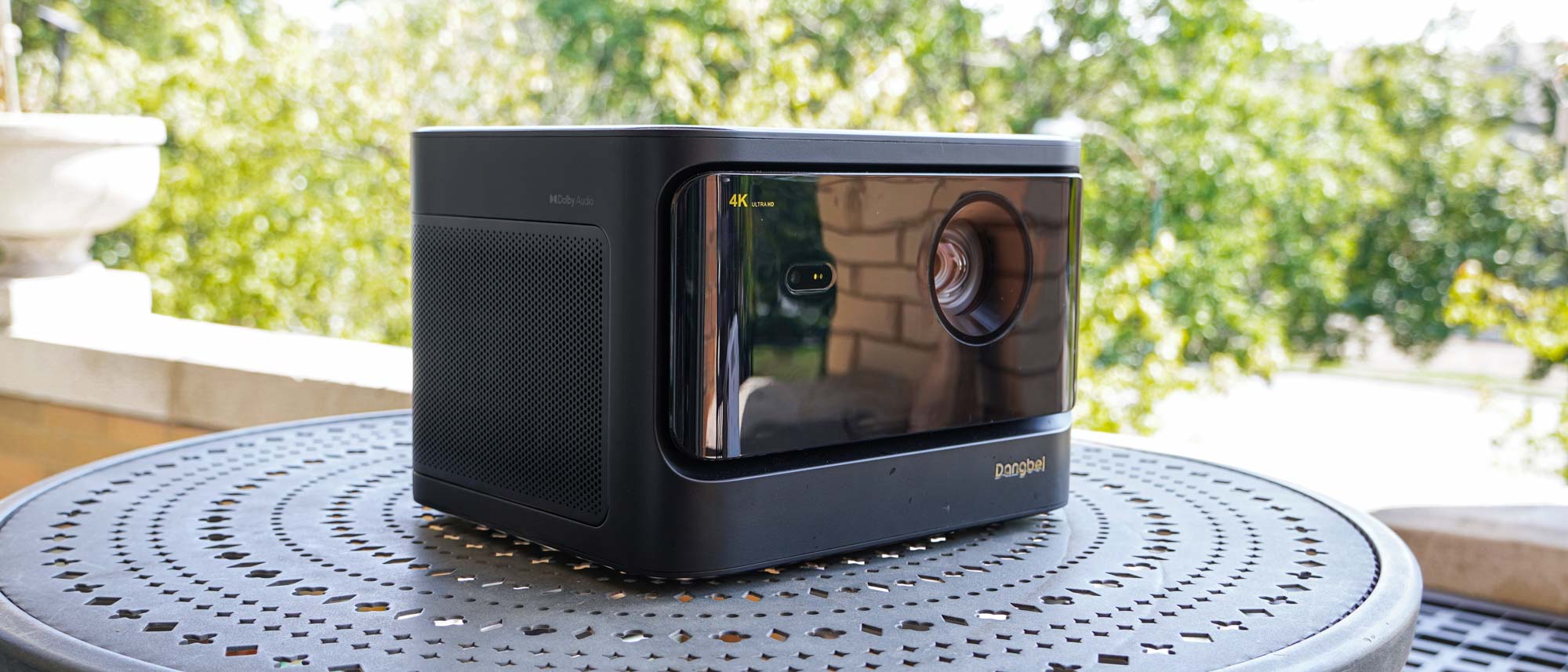Tom's Guide Verdict
The Dangbei Mars Pro 4K’s balanced performance in brightness, color and color saturation helps it beat similarly priced competitors like the Xgimi Horizon Pro. The Dangbei Mars Pro 4K is a strong projector well worth considering when you can find it under $1,500 and almost impossible to ignore at its $1,280 sale price.
Pros
- +
Respectable picture
- +
Ample, full sound
- +
OS runs smoothly
- +
Often discounted
Cons
- -
Some issues with dark scenes
- -
Signal upscaling varies
- -
Color saturation issues
Why you can trust Tom's Guide
Price: $1,799
Screen size: 40-200 inches
Model: Mars Pro 4K
Resolution: 3,840 x 2,160
Projection: ALPD Laser, 0.47” DLP
HDR: HDR10, HLG
Refresh Rate: 60Hz
Ports: 2x HDMI 2.0 (1x eARC), 2x USB
Audio: 2x10W
Smart TV Software: Dangbei Smart OS
Size: 9.68 x 8.22 x 6.81 inches
Weight: 10 lbs.
The trend towards simpler, more stylish box projectors that put everything you need into one package has been effectively pushed forward by Xgimi with the likes of the Horizon Pro. But Dangbei is entering the scene with a competitive option of its own in the Mars Pro 4K.
The Dangbei Mars Pro 4K is a sharp, laser projector that strikes a great balance for features, picture quality, audio, and price. It’s perhaps one of the better, complete packages you’ll find for a little over $1,000 without needing to spring for many extras, like a soundbar or streaming stick, and dollar-for-dollar outperforms similarly priced competition. It doesn’t outperform the best projectors money can buy, but at just $1,299 when it’s on sale, you can’t do much better.
Dangbei Mars Pro 4K review: Pricing and availability
The Dangbei Mars Pro 4K costs $1,799 and is available from Amazon. Its retail price isn’t the end of the story, though. Since its launch, I’ve seen it almost constantly discounted, so you’ll likely be able to get somewhere between $200 and $500 off.
Dangbei also offers the Mars projector for $999, but this is a 1080p model offering a different brightness level. Since it’s running on substantially different hardware just housed in a similar chassis, I wouldn’t suggest making judgments on the quality of that model based on the results of the Mars Pro.
Dangbei Mars Pro 4K review: Design
The Dangbei Mars Pro 4K follows the trend of small, boxy projectors that can better blend in with home decor than the office paraphernalia-like projectors that are still quite common. It’s almost a perfect cube, only it has rounded corners. A perforated grille wraps around the back and sides, offering ventilation and a way for sound from the dual 10-watt speakers to get out.
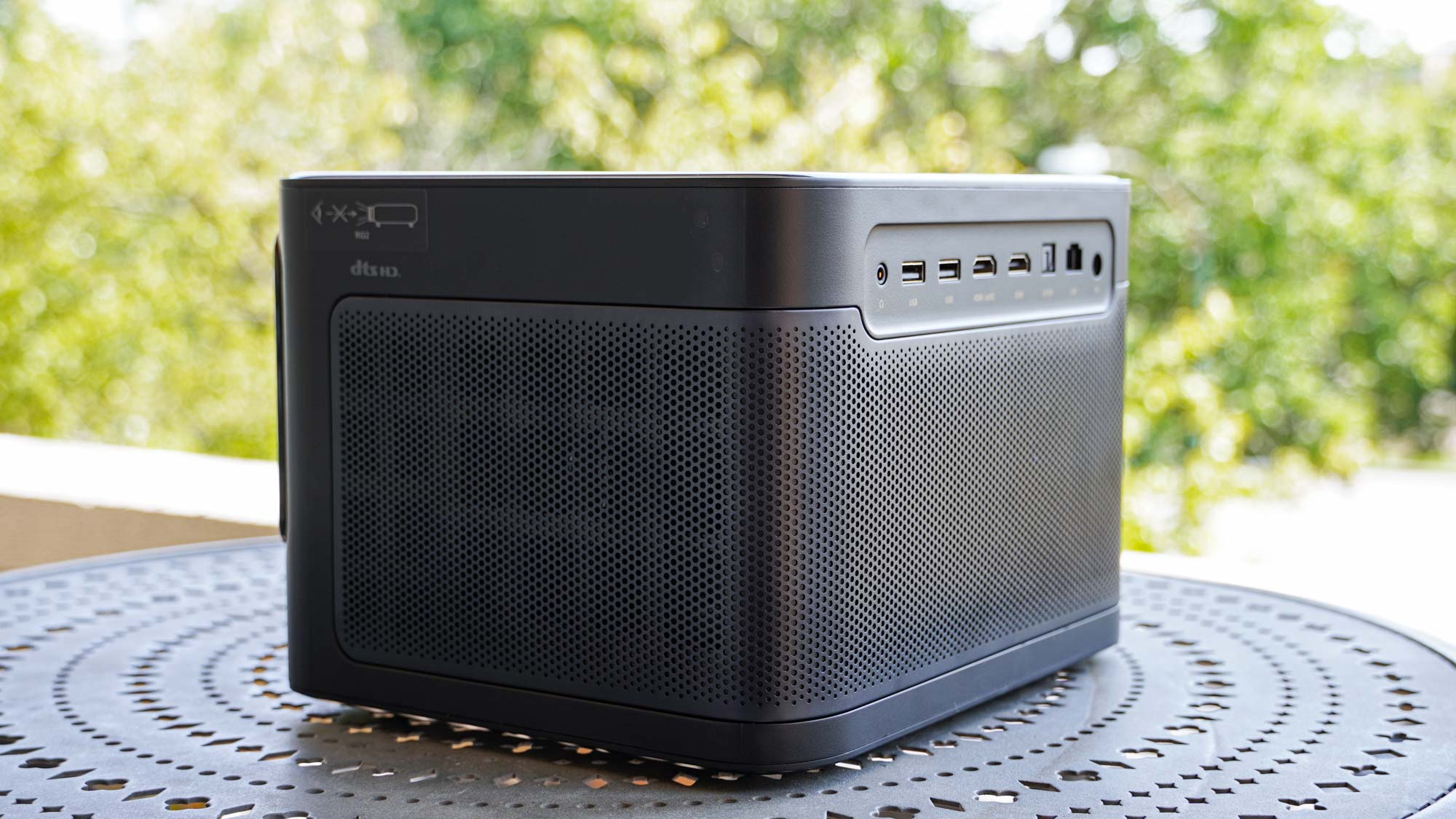
The top of the projector has a power button and an ambient light sensor, which can adjust the projector’s picture to adapt to the room you’re watching in. It has a smooth, glass top with curved edges for a classy look.
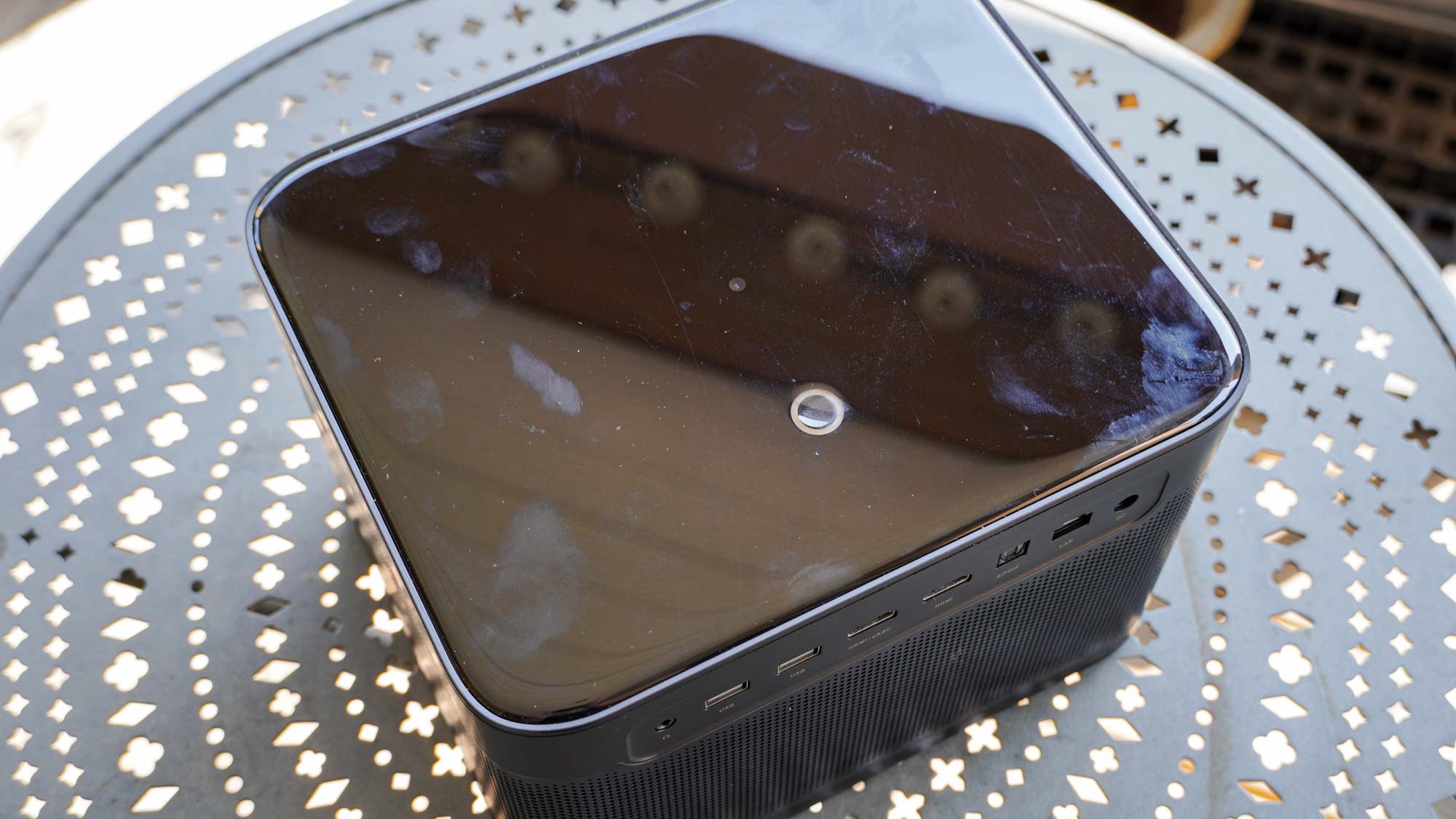
Underneath, the projector sits on four rubber feet that can be adjusted to change the angle. They can also be removed completely, opening up the threaded holes to use with projector mounting hardware. There’s also a threaded hole in the middle for a ceiling mount or a tripod, though this projector is heavier than you’d likely want to use with a run-of-the-mill tripod.
The front of the projector has a sleek, glass-like cover spanning its width. It houses the large lens as well as a camera and sensor setup for automatic picture adjustments. Like many of these-style projectors, there’s no lens cover though, just a glass protector that you’ll want to avoid scratching.
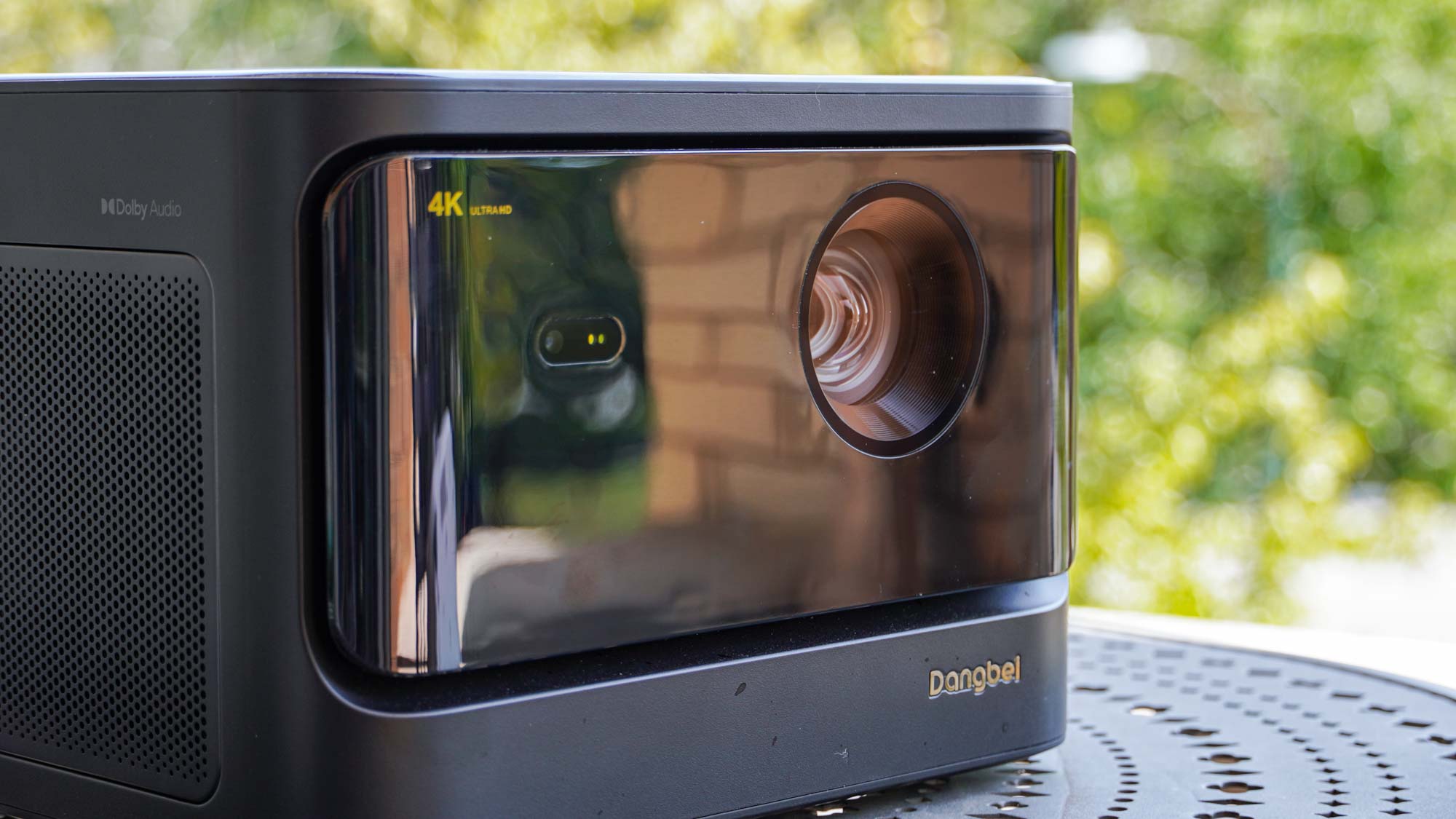
There are plenty of ports on the Dangbei Mars Pro 4K. They’re arranged on the back along the top edge, which unfortunately makes for some inelegant cable dangle, and will see any streaming sticks potentially flopped in front of the exhaust vents. There are two HDMI ports (one capable of eARC), two USB ports, optical and 3.5mm audio outputs, and an Ethernet port. However, what that Ethernet port is good for on a projector without a smart operating system, I don’t know.

Since the Dangbei Mars Pro 4K doesn’t have a smart TV operating system baked into the hardware, it instead relies on an external streamer so you’ll be looking at having one of those HDMI and USB ports occupied right away if you opt to use the included streaming box — the Hako Mini that comes with the projector is competent little Android TV device on the level of the Chromecast with Google TV, so it’s not all bad.
Dangbei Mars Pro 4K review: Performance
In addition to adjustable feet, the Dangbei Mars Pro 4K has some smarts for getting the picture set up. In just a few short seconds, it can automatically make keystone corrections to square the image with a wall or screen, and it will resize the image to fit within a constrained space and avoid obstacles on a wall. It can also automatically focus. These tools have proved fairly reliable and quick. If anyone gets in front of the projector, it can also quickly dim the light output as eye protection.
With it set up, the Dangbei Mars Pro 4K offers generally enjoyable visuals. It’s reasonably bright for a rawhide range of scenarios, including watching bright content in a modestly-lit room or enjoying anything you like in a fairly dim room. This isn’t one of those projector’s you have to caudle in a pitch black room.

4K clarity, coming by way of a four-way pixel shifting, helps make the projector a great watch at a wide range of sizes. Whether it was casting a roughly 55-inch picture on my ceiling or going for closer to a 100-inch one in my living room, it doesn’t feel like it’s lacking detail.
The Mars Pro 4K’s contrast is decent, helping deliver a more dramatic picture when it’s called for. Bright elements pop out from the darkness with a compelling glow, and that contrast really helps amp up the feeling of the color.
Color performance, while overall decent, largely depends on the content you’re watching. When you’re watching extremely colorful content, like cartoons, it has an enjoyable presentation. While watching Star Wars: The Clone Wars, I was surprised at how dazzling many of the effects looked. With all sorts of lasers lighting up the screen all the time, I never felt like the coloring was bland. Watching Avatar 2, it was a little more apparent the lack of depth to the color, as I’ve seen the Na’Vi look a lot bluer on other projectors.

While bright details popped pleasingly thanks to the light output, against the dark backdrop many dark details blended together. I noticed in my testing that dark shades can get murky, losing the fine detail in motion. I noticed this while watching an episode of Star Wars: The Clone Wars, which saw a large battle taking place on a dark planet with lots of fog. This was present in most picture modes but, interestingly, was improved significantly by the Game picture mode, which suggests it’s linked to the projector’s approach to image processing.

The game mode also seems to fully deactivate MEMC motion smoothing, which I find is preferable. MEMC can reduce the judder during panning and moving camera shots, but it introduces some awful artifacts for just about anything else that’s moving on screen, like characters. It can be disabled manually in other picture modes as well.
Eagle-eyed viewers will also notice some film grain and noise in dark scenes no matter the mode. I was able to notice this consistently while watching Justified, as there’s a lot of noise in the darker scenes of the show. Brightly lit scenes, however, continued to look great.

It can also be worth swapping out the input device if you notice any performance issues. In my testing, the image looked great when the projector was receiving a 4K video signal from my Chromecast, but both the ghosting and weird pixel flicker were amplified when it switched to receiving a 1080p video signal from my Chromecast. The ghosting issue was especially egregious in this case, making dark content hard to watch. Switching to a 1080p signal coming from my PC, there was little issue playing the same content back with the same projector settings — the ghosting effect was negligible.
Dangbei Mars Pro 4K review: Test Results
The Dangbei Mars Pro 4K puts its laser light source to work delivering a bright picture. Using a light meter to measure the lux at 9 points across an all white image in the projector’s brightest mode and multiplying this by the projector screen area, the projector hit 1,811.9 lumens.
| Row 0 - Cell 0 | Dangbei Mars Pro 4K | BenQ HT2060 | JMGO N1 Ultra | Epson Home Cinema 3800 | Optoma GT2100HDR | Xgimi Horizon Ultra | XGIMI Horizon Pro |
| Brightness (ANSI lumens): | 1812 | 1645 | 2143 | 2375 | 3012 | 1296 | 1270 |
| Contrast: | 1105:1 | 3253:1 | 1577:1 | 2055:1 | 2370:1 | 250:1 | 757:1 |
| sRGB coverage: | 92% | 99% | 100% | 91% | 90% | 100% | 100% |
| DCI-P3 coverage: | 75% | 87% | 96% | 76% | 74% | 90% | 83% |
| Input lag (default): | 152ms | 25ms | 144ms | 24ms | 26ms | 145ms | 144ms |
| Input lag (gaming mode): | 27ms | 27ms | 28ms | 24ms | 25ms | 26ms | 24ms |
| Lifespan: | 30,000 hours | 30,000 hours | 30,000 hours | 5,000 hours | 30,000 hours | 2,5000 hours | 30,000 hours |
It even managed this with a respectable contrast ratio. In the same setup that saw an average lux reading of 1,878.6 for an all-white image, I measured 1.7 lux for an all-black image to get a rough contrast ratio measurement of 1105:1. That’s a fair bit better than the typical IPS display common among TVs and monitors and a good showing for a projector, as they often can struggle to keep up with traditional displays in this department.
Color isn’t as impressive for Dangbei, though. Using a SpyderX Elite colorimeter with DataColor’s software to measure color gamut against a 1.1-gain projector screen, I only measured 92% coverage of the sRGB color space and 75% coverage of DCI-P3. This is a common shortcoming among single-laser projectors compared to the tri-color options on the market. It also sees the projector fall short of the color on LED-powered options, like the Xgimi Horizon Pro or BenQ HT2060. The trade-off comes with a brighter picture, though.
Dangbei Mars Pro 4K review: Audio
There’s a respectable set of speakers inside the Dangbei Mars Pro 4K. The pair of 10-watt drivers pump out sound that’s more than substantial enough for a small room. I comfortably watched Avatar 2 with the volume never going above 30%. Maxing volume out, you won’t be able to beat one of the best soundbars with a dedicated subwoofer, but you’ll get enough sound for a 200 square foot room and a handful of people gathered around for a movie. If you’re trying to watch outdoors, you’ll want to sit close to the speakers, though.
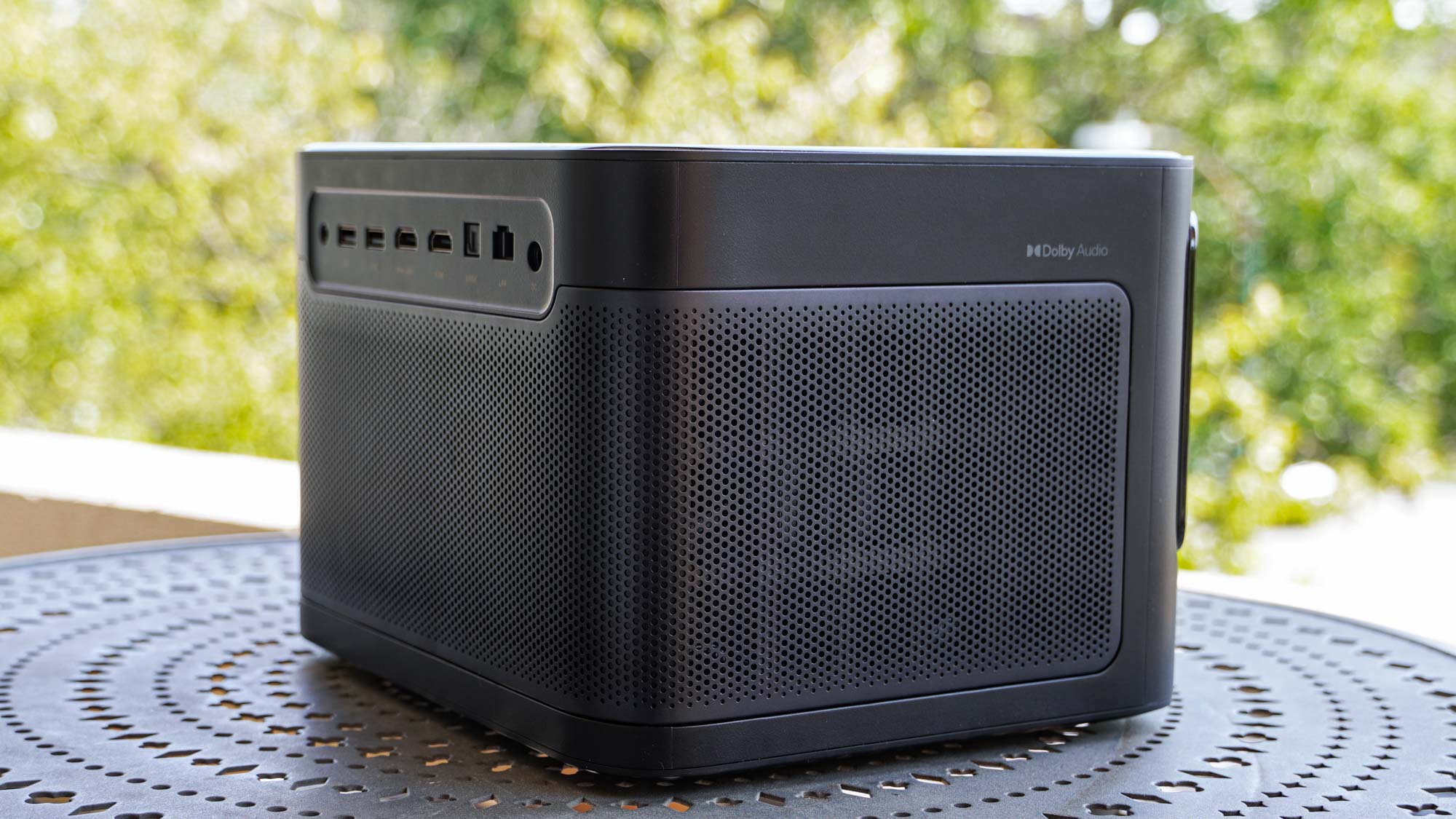
On the plus side, the speakers hold up well when they’re cranked. They offer a nice, wide frequency response, allowing the sound to feel full. And I didn’t catch them distorting.
The projector itself makes a little noise. When it’s running at full brightness, it makes a subtle whirring that’s easily drowned out by the speaker system. And switching to the Energy Saving mode, which is still bright enough for a dim room, it got even quieter.
Dangbei Mars Pro 4K review: Gaming
The Dangbei Mars Pro 4K isn’t suited for gaming right from the jump, as it has a default latency measured at roughly 152ms. That’s slow enough to be problematic.
Fortunately, there’s a game mode that dropped that latency to a measured 27ms. Dangbei causes a little confusion by having a Game Mode in the HDMI settings and a Game visual preset in the Picture settings. It’s the former setting essential to getting the lower latency.

Though the game mode may make some sacrifices to visuals, I can’t say they were visually apparent. Playing through the opening segment of Horizon Forbidden West, I was thoroughly immersed in the visual splendor, with the Mars Pro 4K offering respectable detail and bright, rich colors.
Fighting robots around the game, I didn’t feel the least bit of latency causing missed dodges or hitches in navigating the menus. It may not be offering a fast refresh rate or VRR — nothing of that sort — but it’s still a respectable display for gaming.
Dangbei Mars Pro 4K review: Smart TV Interface
The Dangbei Mars Pro 4K operates a little bit more like a TV without a super smart operating system set up out of the box. While the system comes with an Android TV device to add smarts to it, you have the choice to add your own device instead. Impressively, the input switcher shows a live picture-in-picture of a highlighted HDMI source.

The projector does have its own basic operating system, Dangbei Smart OS, which handles input switching, settings adjustments, and local media playback. It’s also the brains behind automatic brightness, keystone, and focus adjustments. There is a semi-smart layer to it that includes a video-streaming-focused web browser and an app that makes it a valid target for casting content, though I couldn’t always get it to work. In poking around, I discovered the community app details a way to download the Emotn app store and access more streaming apps directly on the projector, but one should be wary of this kind of third-party app store. If you’re desperate for some streaming sources, the included Android TV device is more than sufficient.
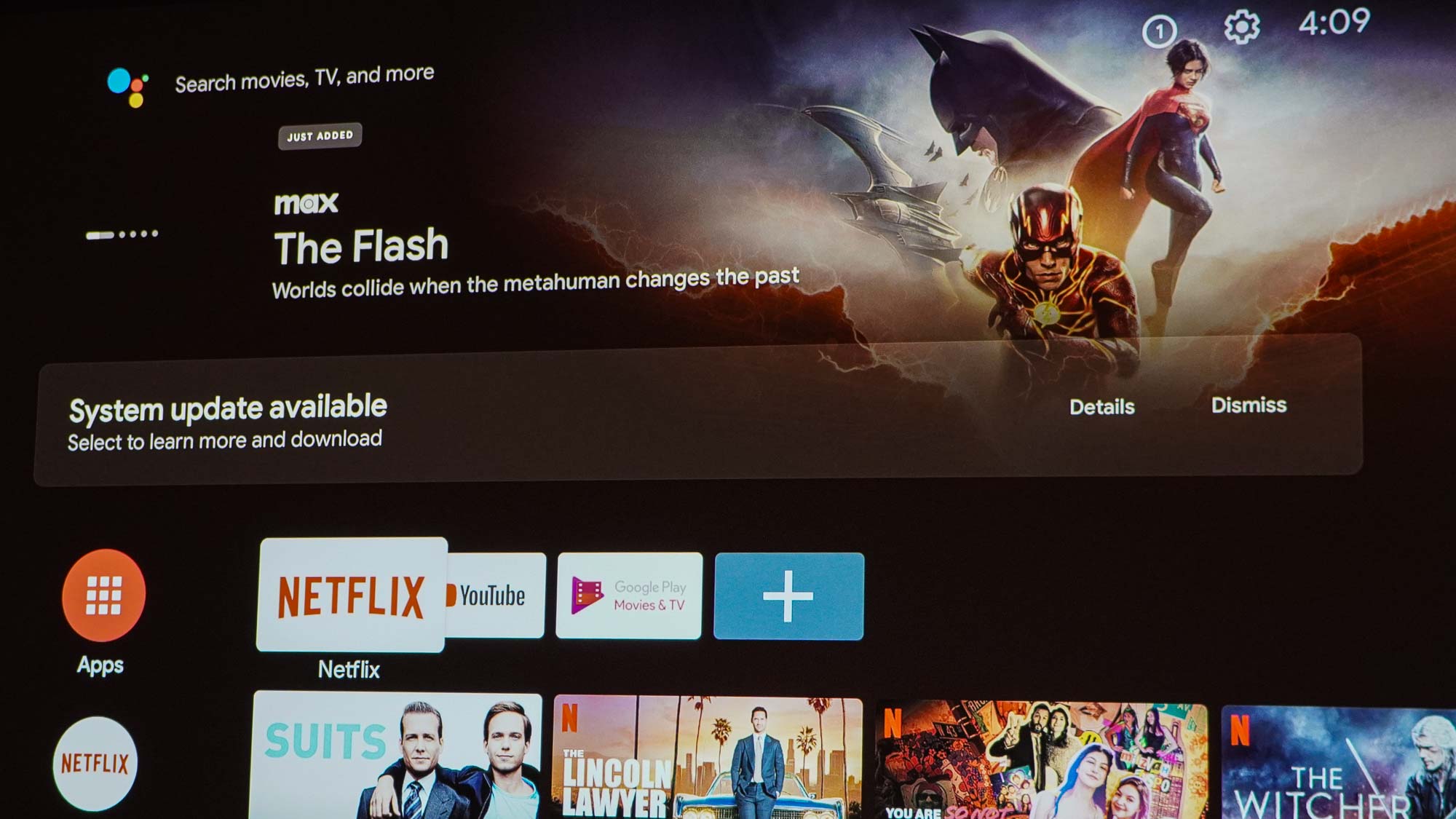
There is a benefit to the projector’s simple smarts, though. It doesn’t get bogged down by too many things running at once, so adjusting picture settings and volume is always quick — something I cannot say is the same for projectors with Android TV baked in. There’s even a settings shortcut button right on the side of the remote. And with some standard Android TV-style navigation buttons on the remote, it can actually be used to navigate a connected Android TV device in place of the proper remote.
Dangbei Mars Pro 4K review: Remote control
The remote for this projector is a simple and effective one — at least, it is once you provide your own pair of AAA batteries. It has a round navigation ring with a selection button in the middle. This is useful for getting around the projectors menus and even navigating within external devices that allow it (my Chromecast with Google TV did). There’s a back button that similarly works within the projector or external devices. A home button serves as a quick route back to the main screen of the projector. There’s a special button for turning on “mouse mode” which pulls up a cursor you can control with navigation buttons in case you end up on a website or app that needs it. There’s also a menu button, but it only works in a few special situations.
The volume buttons are separated out at the bottom of the other controls, making them easy to find by touch alone, which is important since there’s no backlighting on the remote. A single button on the side of the remote pulls up a customizable quick menu for various image and sound settings and projection controls. Holding the button also has the projector perform an automatic focus adjustment.
Dangbei Mars Pro 4K review: Verdict
The Dangbei Mars Pro 4K starts with strong fundamentals for video and audio, which goes a long way. It’s plenty bright, modestly colorful, and offers reasonable contrast for enjoying most movies and TV shows. With impactful sound to bolster the image, it becomes a competent all-in-one package.
That said, it’s a little annoying to need an external video source — especially when that video source creates issues in performance. Although some might see the lack of a smart platform inconvenient, the Mars Pro 4K shows the benefit of a streaming platform processed externally while all the computation for picture and projection settings happens onboard the projector, making those settings much more responsive as a result.
Despite some caveats, the Dangbei Mars Pro 4K is a strong projector well worth considering when you can find it under $1,500 and almost impossible to ignore at its $1,280 sale price.
Over the last several years, Mark has been tasked as a writer, an editor, and a manager, interacting with published content from all angles. He is intimately familiar with the editorial process from the inception of an article idea, through the iterative process, past publishing, and down the road into performance analysis.
